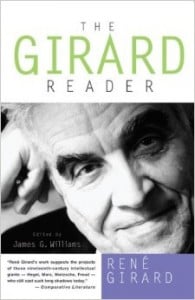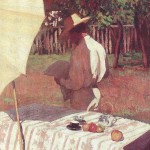My colleague Kathy Schiffer followed the Brittany Maynard assisted suicide case closely on her blog. There was a moment when it seemed Maynard had changed her mind. But it was not to be. Her solution was a result of her terminal cancer combined with a fear of dependency.

Right around the same time I ran across a quote from the Rene Girard Reader on John Medaille‘s wall. Here is what Girard says about assisted suicide as a solution:
The experience of death is going to get more and more painful, contrary to what many people believe. The forthcoming euthanasia will make it more rather than less painful because it will put the emphasis on personal decision in a way which was blissfully alien to the whole problem of dying in former times. It will make death even more subjectively intolerable, for people will feel responsible for their own deaths and morally obligated to rid their relatives of their unwanted presence. Euthanasia will further intensify all the problems its advocates think it will solve.
There is an odd parallel with what I wrote about the Reformation following the argument of Brad S. Gregory’s The Unintended Reformation. Both the Reformers and the advocates of assisted suicide proposed forceful solutions in good-will that ultimately end up having unintended consequences.
It’s a strange paradox of life how solutions end up causing more trouble than the problems they address. I’ve realized that such is the case with the repetitive thoughts Martin Laird describes in A Sunlit Absence. Our repetitive thought patterns are an attempt of the mind to solve problems in our inner lives through criticism and problem-solving. But that only leaves the mind mired in an endless cycle of self-criticism that frequently leads to depression. It seems that the only way to get out of the vicious circle is to let go of the handrail and let life take its course through an openness to life’s ever-giving and ever-present Source.
Not that this letting be is something that is easily acquired. I don’t even know how I would react to terminal cancer or the pre- and post-Tridentine mess that was Catholicism. I suspect I would freak out and do something more drastic than Luther, but it wouldn’t help.
As I look at all these difficult issues I think of a Milosz poem. It gently suggests how much we depend upon the unexpected gift of grace to heal the rifts in our lives. It also suggests, between the lines, how much awkwardness, how many difficulties, we face in our lives and in our world.
“Gift” by Czeslaw Milosz
from Collected Poems
A day so happy.
Fog lifted early. I worked in the garden.
Hummingbirds were stopping over the honeysuckle flowers.
There was no thing on earth I wanted to possess.
I knew no one worth my envying him.
Whatever evil I had suffered, I forgot.
To think that once I was the same man did not embarrass me.
In my body I felt no pain.
When straightening up, I saw blue sea and sails.












